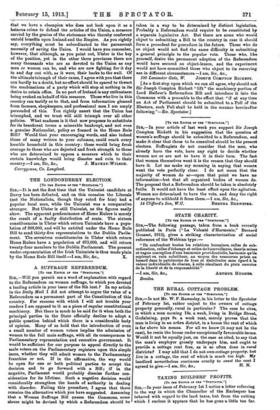A SUFFRAGE REFERENDUM.
[TO THE EDITOR OF THE " SPECIATOR."1
SIR,—Will you permit me a word of explanation with regard to the Referendum on woman suffrage, to which you devoted a leading article in your issue of the 8th inst. P In my article in the Daily Mail I did not attempt to argue the value of a Referendum as a permanent part of the Constitution of this country. For reasons with which I will not trouble your readers I am opposed to it as a piece of regular constitutional machinery. But there is much to be said for it when both the principal parties in the State officially decline to adopt a public question behind which there is a considerable body of opinion. Many of us hold that the introduction of even a small number of women voters implies the admission of woman to the full male suffrage, with all its consequences to Parliamentary representation and executive government. It would be sufficient for our purpose to appeal directly to the male voters on the Parliamentary registers upon this simple issue, whether they will admit women to the Parliamentary franchise or not. If in the affirmative, the way would he open for one or both political parties to accept the decision and to go forward with a Bill ; if in the negative, Parliament would probably dismiss further con- sideration for its lifetime. Such a negative decision would considerably strengthen the hands of authority in dealing with disorder. Failing this procedure, I agree that there remains the alternative which you have suggested. Assuming that a Woman Suffrage Bill passes the Commons, some clause might be devised by which a Referendum should be
taken in a way to be determined by distinct legislation. Probably a Referendum would require to be constituted by a separate legislative Act. But there are some who would object to submitting a Bill to the country in case it should form a precedent for procedure in the future. Those who do so object would not find the same difficulty in submitting a general principle to the popular vote. Those who, like yourself, desire the permanent adoption of the Referendum would have secured an object-lesson, and the experiment would not have committed those who object to its recurring use in different circumstances.—I am, Sir, &c.,
100 Lancaster Gate, W. JOSEPH COMPTON BICEETT.
[As a first step upon which we can all agree, why should not Sir Joseph Compton Rickett " lift " the machinery portion of Lord Balfour's Referendum Bill and introduce it into the Commons with a preamble to the effect that "if at any time an Act of Parliament should be submitted to a Poll of the Electors, such Poll shall be hold in the manner hereinafter following."—ED. Spectator.]










































 Previous page
Previous page